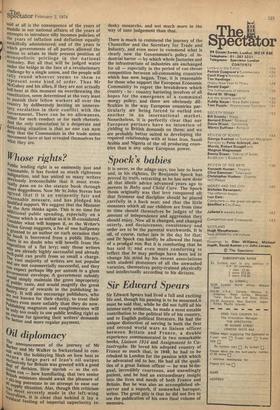0,1 diplomacy
hialre announcement of the journey of Mr ber and Mr Walker to Switzerland to consuelt with the holidaying Shah on how best to eUre a large part of Iran's oil output ekaeclusively for Britain was greeted with a good 4.1 of derision. How slavish — so the criif,lsjno ran — how humiliating, that two senior arilt.sh ministers should await the pleasure of °il:1-ing potentate in an attempt to ease our W,'uPPly situation. Alas, though this criticism Gtgts Most severely made in the left-wing rejtplian, it is clear that behind it lay a luttal feeling of imperial superiority to dusky monarchs, and not much more in the way of sane judgement than that.
There is much to commend the journey of the Chancellor and the Secretary for Trade and Industry, and even more to commend what is clearly now the Government's policy of industrial barter — by which whole factories and the infrastructure of industries are exchanged for oil — especially in the period of cut-throat competition between oil-consuming countries which has now begun. True, it is reasonable for those who support the European Economic Community to regret the breakdown which country to country bartering involves of all hopes for the emergence of a communal energy policy; and there are obviously difficulties in the way European countries particularly are being forced to outbid one another in an international market. Nonetheless, it is perfectly clear that our European partners have no intention of yielding to British demands on them; and we are probably better suited to developing the required relationship with at least Iran, Saudi Arabia and Nigeria of the oil producing countries than is any other European power.


































 Previous page
Previous page